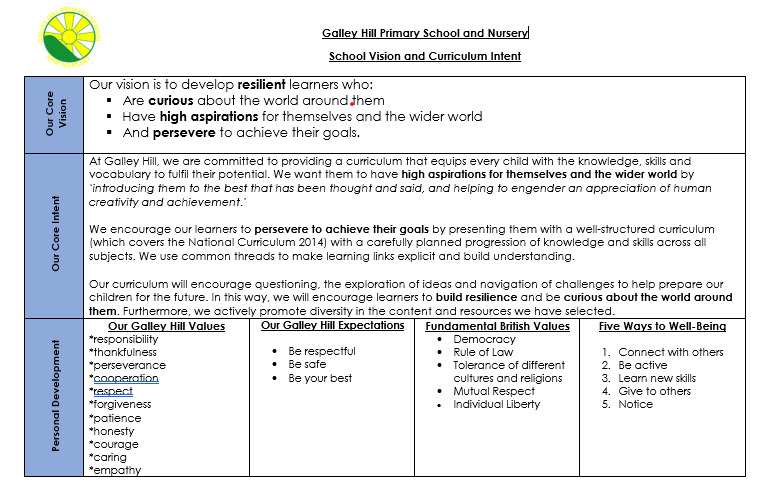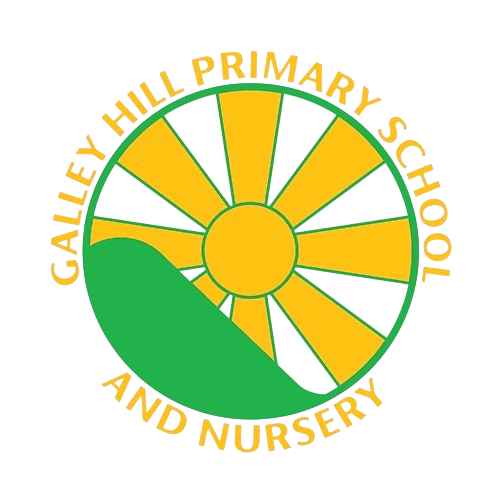Curriculum
At Galley Hill Primary school and Nursery, we aim to meet the statutory requirements of the National Curriculum, the Relationships Education guidance, the Early Years Foundation Stage guidance and the Hertfordshire Agreed Syllabus for Religious Education. Links to all of these statutory documents can be found below:
- The National Curriculum in England
- Relationships Education, Relationships and Sex Education (RSE) and Health Education
- Statutory Framework for the Early Years Foundation Stage
- Hertfordshire Agreed Syllabus of Religious Education 2023-2028
As school staff and governors, we have thought carefully about how best to address these key documents in order to meet the needs of our Galley Hill children. With thought given to our school vision statement and values, we devised our school Curriculum intent on which to base 'Our Curriculum'.

Subject Leaders have worked with teachers and leaders to carefully devise 'Our Curriculum'. This is our overview for the children's learning, in each subject area, as they progress through the school. We have devised clear statements of intent for curriculum coverage in each year group and clear end points for the end of the children's time at Galley Hill.
Through discussion, research and careful consideration of the needs of our children, we have chosen to either write our own curriculum documentation (English, Science, History, Geography, Art and Design, Design and Technology) or use a published scheme adapted to the needs of hate children at Galley Hill. We have chosen to use:
- Maths - White Rose
- Music - Kapow
- Computing - Purple Mash
- Physical Education - RealPE
- French - Language Angels
- Religious Education - NATRE RE
- Personal, Social, Health and Economic Education (including Relationships Education) - PSHE Association
Using Our Curriculum overview, teachers have devised 'Journey Planners' for each unit of work for the vast majority of the foundation subjects. Our Journey Planners are shared with the children on screen for each lesson and in their books. These outline the key learning (in the form of questions) for each lesson in the unit of work, in addition to key vocabulary and a brief overview of how this learning fits into what has gone before and what is to come. It is our intention that these explicit guides support the children in making meaningful links between learning in different terms, year groups and subjects. We are supporting them in making good progress by knowing more and remembering more.
Copies of any of our Journey Planners are available on request. In order to provide parents of an overview of what their children will be learning each term, we also send home termly 'curriculum overviews'.
- Reception Curriculum Overview - Autumn 2024
- Year 1 Curriculum Overview - Autumn 2024
- Year 2 Curriculum Overview - Autumn 2024
- Year 3 Curriculum Overview - Autumn 2024
- Year 4 Curriculum Overview - Autumn 2024
- Year 5 Curriculum Overview - Autumn 2024
- Year 6 Curriculum Overview - Autumn 2024
Phonics and reading
Our chosen phonics scheme is Supersonic Phonics Friends. You can find out more about this scheme on their website: Home - Supersonic Phonic Friends. Our children in Early Years and Key Stage One have a daily phonics lesson using the materials from this scheme. We endeavour to invite parents into school, at least once per year, for a workshop and open lesson in order to support you in supporting your child in this essential life skill. Phonics allows children to become confident and competent readers and spellers.
The children all have a home reading book. This book is carefully matched to the phonics teaching they are working on in school. We expect parents to listen to their child read at least four times per week. Once the children have progressed through the phonics scheme, they will become 'free readers'. We encourage the children to select age-appropriate books from their class libraries in school with special 'gold spot' books being carefully selected for breadth and interest. Class teachers are always happy to recommend books for any children.
Early Years Foundation Stage
We believe that a purposeful and positive start to school prepares children for educational success across their school careers. We have thought carefully about what we want all of our children to achieve during their time in Early Years (Nursery and Reception) and have drawn on best practice and research. Using this information, we have created 'Curriculum Ambitions' for our Early Years Foundation Stage. These are the basis for our rationale about what to teach, how to teach it and when to teach it.
Using these ambitions, the statutory framework for the Early Years Foundation Stage, Developmental Matters and working with subject leaders from across the school, we have devised our detailed curriculum overview for the key stage. This document sets out our intent to ensure progression for children as they pass from Nursery into Reception and prepares the children for the next stage of the education, as they pass into Year 1.
Early Years Foundation Stage Detailed Curriculum Overview
Relationships, Health and Sex Education
As part of each child’s educational experience here at Galley Hill, we aim to promote personal wellbeing and development through a comprehensive taught programme of Personal, Social, Health and Economic Education (PSHE) that gives children the knowledge, understanding, attitudes and practical skills to live healthy, safe, productive and fulfilled lives, both now and in the future.
The Department for Education introduced statutory relationships, health and sex education (RHSE) following nationwide consultation, which came into effect from September 2020 and all schools are required to comply with the updated requirements. The statutory guidance can be found by following the link towards the top of this page.
The guidance focuses on healthy relationships and keeping children safe in the modern world. It also covers a wide range of topics relating to physical and mental health, wellbeing, safeguarding and healthy relationships. Learning about the emotional, social and physical aspects of growing up will give children the information, skills and positive values to have safe, fulfilling relationships and help them to take responsibility for their own wellbeing.
Recently, we have updated our policy and curriculum documentation with careful consideration of this guidance for RHSE in primary schools. We have taken time to carefully allocate an age and stage appropriate curriculum for our children, which we believe meets our community needs and is in direct response to pupil voice and our school values. When we consulted with our parent population in July 2024, 85% of respondents agreed that content was covered at an age-appropriate time.
Our long-term plan for this important topic area can be found as an appendix to our PSHE and RSHE Policy. This is located on our policies page: Galley Hill Policies
Parents or other members of the public can find out more about the curriculum our school is following, including setting suitable challenges, responding to pupils’ needs and overcoming potential barriers for individuals and groups of pupils, and The Prevent duty and fundamental British values, in the curriculum policy, or by contacting the school office: admin@galleyhill.herts.sch.uk
